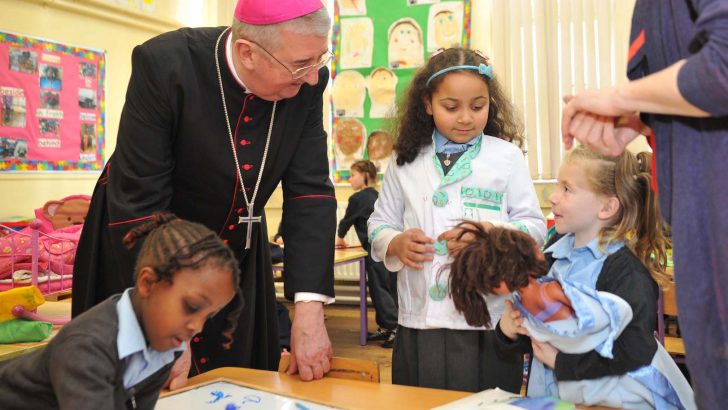The View
Catholic education in this country is not working. Last Summer’s abortion referendum was a wake-up call in this regard: how could so many people, educated in Catholic schools for the most part, have voted to strip the most vulnerable among us of all rights? How could an educated Catholic have voted for the indiscriminate killing of unborn children?
For some time now, it seems that Catholic schools have been churning out more avowed atheists than faithful Catholics. We cannot continue to do what we have been doing in our schools and expect a different outcome. Something has to change.
Catholic parents who want to educate their children in the faith are fighting on two fronts: the threat from without – the State undermining Catholic education at every turn – and the challenges from within – the dumbing-down of the intellectual, spiritual and moral heritage that characterised Catholic education in the past. Both challenges need to be met head on.
Discrimination
The Education (Admission to Schools) Act 2018, which will apply from this year onwards, blatantly and unjustly discriminates against the Catholic child seeking to gain admission to a national primary school.
To explain: all national schools – other than Catholic ones – can favour children of their own denomination in their admissions policy. Protestant schools may give a place to a Protestant child over a child of another religion, Jewish schools may favour Jewish children, Muslim schools may favour Muslim children – all except Catholic schools.
Where a school is oversubscribed, a Catholic child seeking to gain admission to a Catholic national primary school may be refused a place over a child of another religion from now on.
It is hard to understand why the Church seems to be taking this lying down. Catholic parents and their children need the Church to champion their rights and fight for their religious freedoms, because the State certainly won’t.
The Admission to Schools Act is the latest – but not the first and it is unlikely to be the last – government attack on Catholic education in this country.
Similar prejudice and discrimination against Catholic Education was evident in the deletion of Rule 68 which gave religious education a special place in primary schools, the report of the Forum on Patronage and Pluralism which sought to dilute and undermine all religious influence in a school, and the changes to Section 37 of the Employment Equality Act which weakened the ability of a school to employ teachers who would uphold its special ethos.
We can expect more. At the moment, the Provision of Objective Sex Education Bill is before the Dáil. The Bill proposes that the curriculum for relationships and sexuality education in schools should be “factual and objective, age appropriate, and not gender normative”.
They propose that all school children be taught and given information about sexual consent, different types of sexuality, different types of gender, methods of contraception and abortion. They propose that this all be taught in a so-called “factual and objective” manner regardless of the religious ethos of the school. In other words, they want to make it unlawful for a Catholic child to be taught the Catholic vision of human sexuality.
Contrast this attitude towards Catholic education with the attitude of the former Minister for Education towards secular education: Richard Bruton was so closely allied to the organisation Equate, which campaigned for secular education and the undermining of Catholic education, that he had no difficulty opening their Croke Park conference.
The organisation which had “unprecedented access” to the Minister, according to Atheist Ireland, was forced to close last year after failing to comply with the requirements of the Standards in Public Office Commission.
So, it is now against the law for a Catholic national school to favour Catholic children in its admissions policy, and even if the Catholic child does get in, there are moves afoot to ban the school from teaching basic Catholic doctrine.
It is time for a fundamental change to the way we approach Catholic Education in this country. In the past, when the power of the State intervened to obstruct religious education and curb religious freedoms, the Church found a way, through the establishment of hedge schools. We now need to consider radical solutions for our own time.
The Government is doing its best to tie the hands of Catholic educators and parents so that it is almost impossible to provide an authentic Catholic education to Catholic children.
In a functioning democracy that respected and recognised the right to religious freedom and the right of parents to educate their children in their chosen faith, it would be perfectly reasonable to suggest that denominational education should be state funded. After all, Catholics pay taxes too – they should be able to send their children to state-funded Catholic schools. But we are not living in such a functioning democracy. The State discriminates against Catholic children in a way that it does not against children of other faiths or none.
Radical measures are required if we are not to perpetuate the mistakes of the past. It is time for the Church to end its relationship with the State in relation to the provision of education and begin to look after her flock in an authentic manner.
The Catechism of the Catholic Church states that it is a fundamental duty of parents to educate their children. In these circumstances, parents deserve to be supported by the Church, particularly when they are under threat by the State.
What is the way forward, you might ask. The schools under Catholic patronage represent an enormous asset, which the Church needs to consider realising in the interests of actually providing authentic Catholic education, probably to a smaller number of pupils.
Rather than allow further undermining of the faith and the religious freedoms of Catholic children, the Church should act now and sell large numbers of her schools, to the State if it can afford them, or to other interested parties if it cannot. (It would certainly be interesting to see how the State would cope in discharging its duty to educate the children of the nation without the co-operation of the Church.)
Support
With the monies realised, she should establish authentic Catholic schools, for the benefit of parents who wish to be supported in their efforts to educate their children. To ensure that such schools are free of the influence of the State, they cannot rely on State money.
This might mean Catholic schools not being as well funded or having as many facilities as other schools, and they would certainly be fewer in number than at present. Against that, we would have religious freedom and the right to educate our children without the pernicious proselytising of the State. Then we could start concentrating on reforming our Catholic schooling from within.


 Maria Steen
Maria Steen Photo: Clodagh Kilcoyne
Photo: Clodagh Kilcoyne 